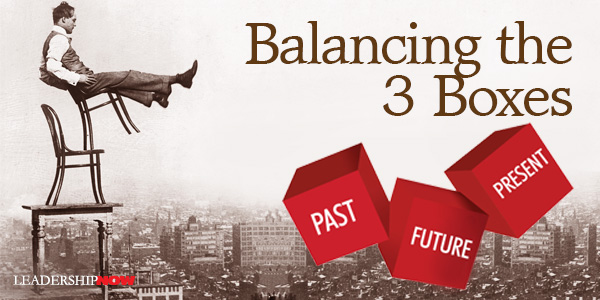 Leading Blog | Posts by Month |
 Leading Blog | Posts by Month |
05.31.16

LeadershipNow 140: May 2016 Compilation
See more on
Posted by Michael McKinney at 04:22 PM
05.25.16

Robert Gates on the Essentials of Leading Change
IN A TIME when change is not just inevitable, but must be encouraged and led, Robert Gates’ A Passion for Leadership is a must-read. Gates has led and continues to lead in a wide variety of organizations and organizational cultures. His collected wisdom serves to inspire us to lead others where they don’t often want to go and improve people’s lives. In addition to serving on numerous corporate boards, he has served as a United States secretary of defense, a director of the CIA, served eight presidents, served as president of Texas A&M University, and is currently the chancellor of the College of William and Mary and president of the Boy Scouts of America. The one feature of the institutions with strong cultures he has led has been a strong sense of family. He describes it as a “commitment to taking care of one another at all times but especially in adversity or times of need.” All great cultures do have this sense of family. At the same time, it is easy then to become insular and tolerate long-standing but inappropriate practices and behaviors because they are a tradition. It is important to define what traditions must be defended and those that must be changed to enable future success. “A good leader,” writes Gates, “must keep coming up with new perspectives, new ideas, new improvements. Only a committed leader can keep an organization—a bureaucracy—on its toes, continuously adapting, innovating, improving.” Gates recognizes that we need leaders at all levels in an organization that are able to mobilize the willing and bring about productive change. More often than not those leaders are there, they just need to be liberated by the person at the top in an organizational culture of leadership. Not surprisingly, he identifies listening as the most critical thing a new leader can do. “Never miss a good chance to shut up.” CIA director Bill Casey gave him some good advice early on. “Bill advised me not to focus on what I disagreed with but to see if there were one or two kernels of information or wisdom worth seizing on—finding a little wheat amid all the chaff. Just because 95 percent of what someone says is nuts, he would say, laughing, doesn’t mean you should ignore the 5 percent that might be useful. (He was always handing me pamphlets or books to read, warning, ‘This guy is crazy, but there’s an interesting idea on page x.’)” To be an effective leader, one must demonstrate from the start an understanding of and respect for the role and views of the career employees in an organization and be clear that the new boss intends to make them participants and partners in reforming the place. This is the best possible preparation of the bureaucratic battlefield. And that doesn’t mean just rearranging the organizational chart. “The main target is how people do their work, not where.” Gates offers from experience, strategies, techniques, and principles for implementing change. He includes many examples from the organizations he has served. Leading change is hard work and can’t be done from on-high. Gates cautions that while micro-knowledge is necessary, micromanagement is not. “For a leader to get the big things right depends a great deal on knowing the little things, especially when implementing difficult and controversial change. Without micro-knowledge, you are the prisoner of your bureaucracy and your staff, and they will play you like a cheap fiddle.” Fundamentally, leadership is always about people. I’ll leave you with a few thoughts from Gates on leading: ☙ You can be the toughest, most demanding leader on the planet and still treat people with respect and dignity. ☙ A self-confident leader doesn’t cast such a large shadow that no one else can grow. ☙ Leaders who think they don’t need frank, critical advice every day are usually doomed. ☙ To change bureaucracies effectively, a leader must first make his people proud and eager to excel. ☙ Formal education can make someone a good manager, but it cannot make a leader, because leadership is more about the heart than the head. ☙ Core to leadership is the ability to relate to people—to empathize, understand, inspire, and motivate. ☙ If you fundamentally don’t like or respect most people, or if you think you are superior to others, chances are you won’t be much of a leader. 
Posted by Michael McKinney at 06:56 PM
05.10.16

Balancing the 3 Boxes
ULTIMATELY our future is not in linear—incremental—improvements. It is in nonlinear—nonconforming, breakthrough—change. But the future is built in the now and that’s the problem. What should we be doing now to ensure we have a future? Dartmouth professor Vijay Govindarajan writes, “As much as we might pay lip service to the fact that the future will differ dramatically from the past, we often behave as though it will be exactly the same.” There is a tension between and what we have to do now to continue on as an entity and what we need to be doing now to create our future along with the things that we are doing that get in our way of doing any of it. How do we create the future while managing the present? Vijay Govindarajan has incorporated good principles for managing change into a framework he calls The Three Box Solution. It is a method to simultaneously meet the performance demands of your current business—one that is still thriving—while dramatically reinventing it for the future. It’s about managing preservation, destruction, and creation. In each Box there is a function that needs to be performed to lead a sustainable business: Box 1: The Present Box – Manage the present core business at peak efficiency and profitability. Box 2: The Past Box – Selectively forget the traps of the past by identifying and divesting businesses and abandoning practices, ideas, and attitudes that have lost relevance in a changed environment and would otherwise interfere with your focus on inventing the future. Box 3: The Future Box – Generate nonlinear, breakthrough ideas and convert them, through experimentation, into new products and businesses. It’s not about predicting the future but it is about being prepared for circumstances you can not control. The Three-Box Solution requires an ability to think and act simultaneously in multiple time frames. Each requires different leadership and you must maintain balance across the 3 boxes. It’s a balance. Most businesses focus on Box 1 – preservation. And understandably so: the rewards are immediate, it is a known quantity and the risks are relatively low. Here’s the challenge: The greater your success in Box 1, the more difficulties you are likely to face in conceiving and executing breakthrough Box 3 strategies. This “success trap” typically arises not from willful intention but from the overwhelming power of success that the past has brought. The most pernicious effect of the success trap is that it encourages a business to suppose it already knows what it needs to know in order to succeed in the future. Boxes 2 and 3 are about creating the future. In Box 1 there is a value in sticking to what you have been good at, but in Box 3 you throw it out. The idea is to be building the future continuously instead of waiting until you are forced to do something. By then it is generally too late. Boxes 2 and 3 are easy to ignore because “when you neglect the future today, you don’t see the damage today.” Box 2 is especially difficult because it is hard to give up on the assumptions that got you where you are today. (Even if they are not working for you, to be frank.) Our resistance to selectively give up the past is arrogance. It reflects a desire to control our world. But it changes and we must strategically change with it. Box 2 issues limit our futures. They are obstacles to Box 3. “It is harder for an organization to admit to itself that it’s time to stop doing something than to know when it’s time to invent something new” in part, because we have so much invested in the past. It becomes an emotional issue. If you “ride the obedient horse of Box 1 all the way through Box 2 and into Box 3 without stopping to consider what needs to be forgotten, you end up stuck in your comfort zone.” Box 1 must be performing or Box 3 concerns are much more difficult to deal with. The 3-Box Solution is a daily operational balancing act. For leaders it means:

Posted by Michael McKinney at 10:29 PM
05.01.16

First Look: Leadership Books for May 2016Here's a look at some of the best leadership books to be released in May.




For bulk orders call 1-800-423-8273  Build your leadership library with these specials on over 100 titles. All titles are at least 40% off the list price and are available only in limited quantities. "Books serve to show a man that those original thoughts of his aren't very new after all." — Abraham Lincoln
Posted by Michael McKinney at 10:33 AM
|
BUILD YOUR KNOWLEDGE


How to Do Your Start-Up Right STRAIGHT TALK FOR START-UPS 
Grow Your Leadership Skills NEW AND UPCOMING LEADERSHIP BOOKS 
Leadership Minute BITE-SIZE CONCEPTS YOU CAN CHEW ON 
Classic Leadership Books BOOKS TO READ BEFORE YOU LEAD |
|